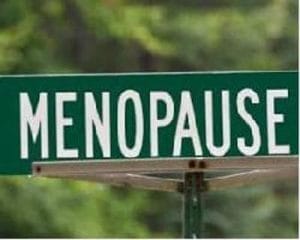Menopause is a natural event, even though the accompanying symptoms feel completely unnatural! Menopause is the term used when a woman has not had a menstrual period for 12 consecutive months. It typically occurs at an average age of 52; however, it can occur between ages 40 and 58. A small percentage of women go through early menopause, which means natural menopause has occurred between the ages of 40 and 45.
 Peri-menopause refers to the transition to menopause and can last several years. During this transition your menstrual cycle usually becomes irregular and you may have cycles where you menstruate, but do not ovulate (your ovaries do not release an egg). Your hormone levels begin changing and you may develop various symptoms that can be frustrating and overwhelming, to say the least.
Peri-menopause refers to the transition to menopause and can last several years. During this transition your menstrual cycle usually becomes irregular and you may have cycles where you menstruate, but do not ovulate (your ovaries do not release an egg). Your hormone levels begin changing and you may develop various symptoms that can be frustrating and overwhelming, to say the least.
Peri-menopause and menopause are a time for important dialogue between a woman and her physician about physiologic changes, assessment of menopause-related symptoms and treatment options, review of screening recommendations, and discussion of disease risk-reduction strategies and psychosocial issues. The topic of menopause should not be tabu and conversations about it do not need to be uncomfortable. I strongly recommend you find a physician who you trust and are comfortable discussing private and intimate details with.

Some of the common symptoms of peri-menopause and menopause include the dreaded hot flashes, mood swings, sleeping problems, change in sexual function and vaginal dryness.If these symptoms become intolerable or are interfering with your quality of life you may want to discuss treatment options with your physician.

Unlike when our mothers and grandmothers entered menopause, there are various treatment options available to help with symptoms. These include hormone replacement therapy (estrogen and progestin), which is not indicated for all menopausal women. Vaginal estrogen is also available and helps decrease vaginal dryness and painful intercourse. Other options include anti-depressants, which have been proven to reduce hot flashes. Other herbal and natural remedies, including acupuncture, black cohosh and phytoestrogens have been proposed as possible treatments for menopausal symptoms; however, studies have not been conclusive on their effectiveness. Not all women need treatment during peri-menopause or menopause and I strongly suggest talking to your physician about any treatments you are considering. Even if you are not interested in treatment, it is still a good idea to discuss your concerns with your doctor so he/she can evaluate you and make sure no other medical issues are contributing to your symptoms.

I am a private physician, board certified in Internal Medicine and am passionate about helping women through what can be a difficult and confusing life transition. There is no reason menopause should interfere with being the person you want to be and doing the things you love. If you live in the North Shore region of Massachusetts, including Marblehead, Swampscott, Salem, Beverly, Danvers, Peabody, Revere, Lynn, or Lynnfield and are looking for a female primary care doctor call my office at 781-842-3961 to schedule a free non-medical consultation with me.

